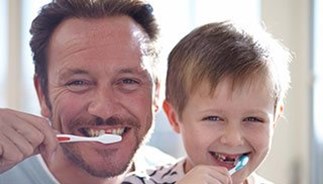Take care of your smile
Build good habits from a young age to look after your teeth and protect your oral health
Good oral health means much more than a lovely smile. Oral diseases are a major health concern and can have a very negative impact on people throughout their lives. World Oral Health Day aims to give people the knowledge to secure good oral health. There’s no reason to suffer pain, discomfort and lack of self-confidence. Most oral health conditions are largely preventable and can be treated at an early stage.
Brush baby teeth as soon as they come through
Use a baby toothbrush with a tiny smear of fluoride toothpaste. The aim is to get the very young used to brushing teeth as part of their daily routine. Children love imitating adults, so parents brushing their teeth regularly with them helps to instil the habit early.
Cut down on sugar
It’s not just a treat – it causes direct harm to teeth. Lollies and sweet drinks in a bottle are particularly bad, bathing teeth in sugar for long periods of time. The acid in fruit juice and squash can harm teeth too, so keep fruit whole and drink milk or water. It’s a common misconception that brushing teeth after something sweet will counteract the damage of eating sugar but, in reality, brushing teeth so quickly after eating is bad for them.
Keep sugar to meal times, so your teeth have enough time to repair themselves between meals. If you cave in to a sugary craving, use a fluoride mouthwash afterwards, or chew some sugar free gum with xylitol.
Children aged three to six
Parents should help children brush their teeth at least twice daily for about two minutes with a pea-sized amount of fluoride toothpaste. Children don’t have the dexterity required to brush effectively until they are seven, so help with brushing until then, and supervise beyond that age to make sure they hit their two-minute brush.
Make friends with your dentist
Children should start going to the dentist when their first milk teeth appear, so that regular check-ups become part of life. The dentist can advise on how to prevent decay and identify any oral health problems at an early stage. Make the trips fun so a fear of their dentist simply doesn’t exist.
‘Habit psychology is key to changing behaviours that have a meaningful impact on your health’
This is all good when it comes to teaching children good habits, but a surprising number of adults don’t give their own teeth the attention they deserve. “Knowing what you ‘should’ do and actually doing it are two different things,” says dentist Katie Perkins. “Habit psychology
is key to changing behaviours that have a meaningful impact on your health. Improve your oral health by using an electric toothbrush, twice a day, for two minutes, ideally before breakfast and before bed. Use an interdental cleaning aid once a day, such as floss or interdental brushes. Always use a fluoride toothpaste, and reduce sugar intake, only eating sugar at meal times. Eat lots of fruit and vegetables, stop smoking and reduce alcohol intake.”
“Many dental-health products for children inspire a short burst of motivation,” Katie adds. “When that wanes you’re back to bathroom battles and tooth-brushing tantrums. Make it a habit, not a chore. This is what inspired me to create Habox – myhabox.co.uk – focused on building habits that lead to health.
“I know what you should do to make your mouth healthy, but helping patients make these changes proved trickier. Habits help us perform tasks without wasting brainpower, and make up around 40% of our daily actions. They can form unintentionally, but can be deliberately formed through a cue-routine-reward cycle which, when repeated over time, eventually becomes automatic.
“It’s vitally important to help children have good oral health and equally important for adults. Start small, even just flossing one tooth to begin with and when this becomes automatic start flossing more teeth. Habit stack by adding it to something you already enjoy, like having a shower. Get your floss on subscription - one less thing to think about, but it’s there, in front of you, waiting to be used.”
Concerned about a gum lump?
For a lump in your gum, make an appointment to see your dentist.
Diagnosis needs a clinical examination, and usually other tests such as X-rays.
Treatment will depend on the diagnosis and in some cases your dentist will refer you to your doctor.
Maintaining good oral health should be something all families do, but the facts are depressing. PHE’s 2015 survey reveals that:
46%: Children aged eight in the UK with tooth decay
35%: Children aged 12 who are too embarrassed to laugh, smile and show their teeth
38% Children who have sleepless nights because of dental problems
2-15: Days of school missed a year for each child with dental health problems
The Benenden Health Cash Plan
The Benenden Health Cash Plan is a simple and affordable way to spread the cost of routine healthcare and cover yourself for many other unexpected expenses. Everyone knows they have regular check-ups with dentists and opticians to pay for, yet they can easily mess up the monthly budget.
Exclusive to Benenden Health members, the Cash Plan costs from as little as £7.65 per month. Level 1 personal cover means you can get up to 100% money back on your regular dental, optical and therapy healthcare bills, and pay-outs for more unexpected health issues like hospital stays. All payments to you can go straight into your bank account.
Prevention is always better than cure – which is where good habits come into their own.


